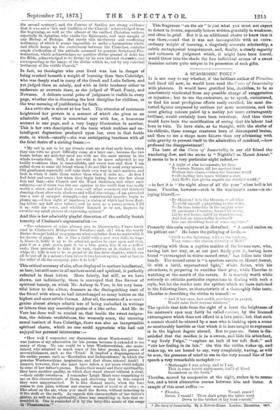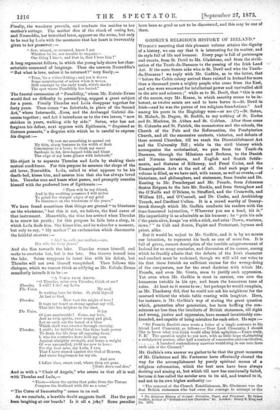A SPASMODIC POET.*
a is not easy to say whether, if the brilliant author of Firmilian had lived till now, he would have read the Curse of immortality with pleasure. It would have gratified him, doubtless, to be so conclusively vindicated from any possible charge of exaggeration or injustice ; but to see the caricature, so to speak, caricatured, to find his most prodigious efforts easily excelled, his most dis- torted figures surpassed by outlines yet more monstrous, and his most glaring colours paled by a motley yet more extravagantly brilliant, would certainly have been vexatious. And then there would have been the mortification of seeing that his labour had been in vain. To have slain, as he thought, with the shafts of his ridicule, these strange creatures born of distempered brains, and then to see a shape more bizarre than any advancing with calm gravity to present itself to the admiration of mankind,—how profound the disappointment!
The hero of the Curse of Immortality is our old friend the wandering Jew, and the scene is " Nightfall on Mount Ararat.' It seems to be a very particular night indeed,-
" A night of sins incorporate, let loose
To torture Nature, till her ancient front Writhes into chaos,—when the heavens recoil Swift-darting into space without a star, And Hell's vast gloom engulfs the startled world ;"
—in fact it is "the night alone of all the year" when hell is let loose. Theudas, however—such is the wanderer's name—is en- joying himself,-
" By Heaven! it is the blossom of all bliss To yield oneself a plaything to the strife, To lie thus babe-like in the mighty arms Of passionate Creation, fanned by storm, Lit by red levins, lnll'd by thunder-roar, And feel an immortality condens'd
Into one throbbing hour of sense supreme."
Presently this calm enjoyment is disturbed. "A sound smites on his patient ear." He bears the galloping of hoofs,—
" Swift as the lightning, wild as the typhoon,
They come—the chosen chivalry of Hell !"
—carrying with them a captive maiden of the human race, who, having lost her way, or, as our poet finely puts it, having been found "extravagant in storm-caused error," has fallen into their hands. The second scene is " a spacious cavern on Mount Ararat, lit with a lurid, supernatural light," where Satan, with his attendants, is preparing to sacrifice their prey, while Theudas is watching at the mouth of the cavern. It is scarcely worth while- seriously to criticise particular expressions in dealing with such a style, but let the reader note the epithet which we have italicised in the following lines, as characteristic of a thoroughly false taste. Theudas is describing the victim to himself :- " And if her eyes, fast seal'd, perchance in prayer, Would raise their envious shutters."
The eyelids that hide from the sight of a lover the brightness of his mistress's eyes may fairly be called envious, by the licensed extravagance which does not offend in a love poem, but that such a conceit should be uttered by a man who is looking upon a scene so unutterably horrible as that which it is here sought to represent- is in the highest degree absurd. But to pass on. Satan is dis- satisfied that the maiden is in a swoon, and bids his attendant, "" my lively Fulgu," " explore an inch of her soft flesh," and. "stir her feeling in its lair." On this the victim wakes up, and wakes up, we are bound to say, very completely, having, as will be seen, the presence of mind to use in the very second line of her speech a very remarkable metaphor :— " Methought I was asleep, and so I am.
This is some horrid night-mare, foal'd of blood Incumbent on the brain."
Thendas, moved by compassion at the sight, rushes in to rescue her, and a brisk altercation ensues between him and Satan. A sample of this must suffice :- " Theudas. Vassal, peace •!
Satan. I vassal ! Thou shalt gorge the bitter word Down to the brisket of thy fond conceit."
• The Curse of Immortality. By A. Eubnic-Evane. London: Macmillan. 1/173.
Finally, the wanderer prevails, and conducts the maiden to her mother's cottage. The mother dies of the shock of seeing her, and Noureddin, her betrothed lover, appears on the scene, but only to be met by Leila with the assurance that her heart is irrevocably given to her preserver :—
" km, wizard, or accursed, know I not Whether he be, nor trouble to enquire—
One thing I know, and that is; that I love him !"
A long argument follows, in which the young lady shows her char- acteristic command of language. Thus she answers Noureddin's 4' Bat what is love, unless it be returned?" very finely,— " True, 'tis a widow'd thing; and yet it draws Some nourishment of solace when it weeps, Still constant by the early tomb, which marks 'The spot where Possibility lies buried."
The funeral ceremonies of " Possibility," whom Mr. Eubule-Evans would find no difficulty in personifying, suggest a great subject for a poem. Finally Theudas and Leila disappear together for -forty years. Then comes "an Interlude, in place of the Second Act," where Intermedii, .rEons, and the Archangel Gabriel dis- course together ; and Act 3 introduces us to the two lovers, " now stricken in years, walking side by aide." Satan, who has not forgiven his defeat, next appears with Epithumia, " disguised as German peasants," a disguise with which he is careful to exprees his disgust :—
"It cost me something to spread out My thin, sharp features to the width of flesh Convenient to a boor; to cloak my sneer Sardonic in fat, dew-lapped folds and blunt The edge of my keen glance with hebetnde."
His object is to separate Theudas and Leila by shaking their mutual confidence. For this purpose be assumes the shape of the old lover, Noureddin. Leila, called to what appears to be his death-bed, kisses him, and assures him that she has always loved him. Theudas sees and hears what passes, and promptly consoles himself with the proferred love of Epithumia :—
" Thou wilt be my friend, And in thy soothing presence I will strive To grind the sharper edges of my grief To bluntness on the whetstone of the years."
We have found sometimes that things are ground "to bluntness on the whetstone," but this is not, we believe, the final cause of that instrument. Meanwhile, the time has arrived when Theudas is to renew his youth ; for this purpose he falls into a sleep, in which Leila finds him. She kisses him, and he wakes for a moment, but only to say, " My mother !" an exclamation which disconcerts the faithful creature:— "Ali! ho calls me mother,—me, His wife for forty years."
And she flies towards the lake. Theudas rouses himself, and seeks to overtake her, but is too late. She throws herself into the lake. Satan reappears to taunt him with his defeat, but Theudas will not own himself vanquished. Then follows this dialogue, which we cannot think as edifying as Mr. Eubule-Evans manifestly intends it to be : — "A VOICE FROM ABOVE.
"0 Theudas. mine own Theudas, think of me ! Theudas. I will! I do! my Leila.
The Voice. My soul Is waiting here for thine. 0, yield thyself At last to God.
Theudas. How vast the might of love ! It tun my heart so strong against my will, That his lies helpless in the dust. The Voice. 0 joy
Of joys unutterable! Come, my love, And as twin spirits, ever young and glad, Let us suck out the honey of a bliss Which shall was sweeter through eternity.
Theudas. I yield ; for faithful love like thine bath power
To drain the life from all opposing force. I, who for centuries have held my own Against almighty strength, and borne a weight Of woe unequalled, yield me now to love : For thy dear sake, my Leila. I own That I have sinned against the God of Heaven, And crave forgiveness for my sin. And now I follow thee, sweet soul, where thou art gone.
[Sinks down and dies."
And so with a " Choir of Angels," who assure us that all is well with Theudas and Leila,—
" There—where the cycles that pulse from the Throne Compass the Godhead with life as a zone."
" The Curse of Immortality" comes to an end.
A; we conclude, a horrible doubt suggests itself. Has the poet been laughing at our beards? Is it all a joke? Some parodies have been so good as not to be discovered, and this may be one of them.



































 Previous page
Previous page